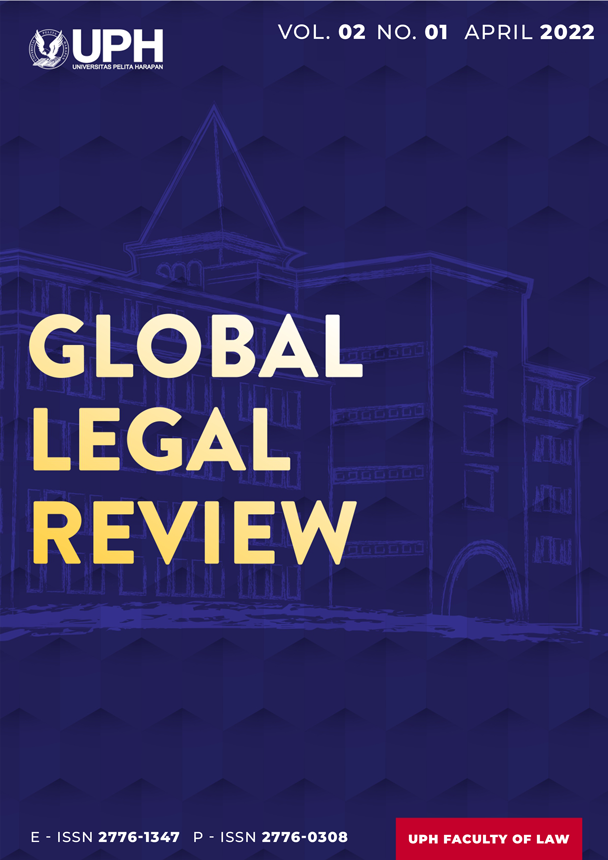The Analysis of Corporate Crime in Indonesia’s Intellectual Property Laws
DOI:
https://doi.org/10.19166/glr.v2i1.5139Keywords:
Corporation, Crime, Intellectual Property RightsAbstract
White-collar crime is a type of crime that involves a large number of individuals, is carried out in a structured, large-scale manner, and results in significantly greater losses than conventional crimes. Given the growing number of organizations, the potential for white-collar crime is currently reasonably high. Corporations are able to commit various crimes, particularly those motivated by profit, such as infringements on intellectual property rights. Given that many of today's intellectual property rights holders are corporations, corporations and intellectual property rights have a strong link. This is understandable given that firms have more resources and cash to invest in developing new products that can be protected by intellectual property rights. As a result of the tight relationship between intellectual property rights and corporations, the government must be aware of potential intellectual property rights violations committed by corporations. This article aims to see if the current set of intellectual property rights legislation can handle corporate crimes. The method employed in this research is a normative juridical method with a statutory approach to produce clear findings from the formulation of corporate crime under intellectual property rights regulations. The study's findings demonstrate how unprepared existing clusters of intellectual property regulations are to deal with prospective corporate criminal activities. The criteria and system of corporate responsibility, as well as alternative consequences for firms, are pretty minimum in these numerous statutes, starting with the framing of the issue of punishment. As a result, based on vicarious liability theory and the corporate culture model, this article proposes that corporations be recognized as punishable entities under all laws controlling intellectual property rights and the establishment of firm standards and corporate obligations. In addition, this study offers suggestions for the types and amounts of punishments that might be appropriate for corporations.
References
Alfons, M. “Implementasi Hak Kekayaan Intelektual Dalam Perspektif Negara Hukum.” Jurnal Legislasi Indonesia 14 no. 3 (2018): 301-311. https://doi.org/10.54629/jli.v14i3.111.
Andreas N. Marbun, Pertanggungjawaban Tindak Pidana Korporasi (Depok: Mappi FHUI), chap. 23. http://mappifhui.org/wp-content/uploads/2020/03/Pertanggungjawaban-Tindak-Pidana-Korporasi.pdf.
Ardiyanto, Erwin Radon."Kebijakan Hukum Pidana Tentang Subyek Hukum Korporasi Di Bidang Hak Kekayaan Intelektual (HKI)." Dissertation. Universitas Islam Indonesia. 2016.
Bhutani, Shalini. “Two Countries, One Corporation and Its Intellectual Property Rights” Economic and Political Weekly 51, no. 37 (September 2016): 16-18. https://www.jstor.org/stable/44003701.
Darmawan, M.Kemal. Teori Kriminologi. Jakarta: Universitas Terbuka, 2007.
DJKI. “Laporan Tahunan Direktorat Jenderal Kekayaan Intelektual 2020”. Kementerian Hukum dan Hak Asasi Manusia Republik Indonesia. 2020. https://dgip.go.id/unduhan/laporan-tahunan?tahun=2020.
Falvey, Rod, Foster, Neil, and David Greenaway. “Intellectual Property Rights and Economic Growth”, Review of Development Economics 10 no. 4 (November 2006): 1-24. https://doi.org/10.1111/j.1467-9361.2006.00343.x.
Farid, Andi Zainal Abidin and Andi Hamzah. Bentuk-Bentuk Khusus Perwujudan Delik (Percobaan, Penyertaan, dan Gabungan Delik) dan Hukum Penitensier. Jakarta: RajaGrafindo Persada, 2006.
Indonesia. Law Number 29 Year 2000 Concerning Plant Variety Protection. 2000.
Indonesia. Law Number 30 Year 2000 Concerning Trade Secrets. 2000.
Indonesia. Law Number 31 Year 2000 Concerning Industrial Design. 2000.
Indonesia. Law Number 32 Year 2000 Concerning Integrated Circuit. 2000.
Indonesia. Law Number 8 Year 2010 Concerning Integrated Money Laundering. 2010.
Indonesia. Law Number 28 Year 2014 Concerning Copyright. 2014.
Indonesia. Law Number 13 Year 2016 Concerning Patent. 2016.
Indonesia. Law Number 20 Year 2016 Concerning Trademarks and Geographical Indication. 2016.
Indonesia. Law Number 11 Year 2020 Concerning Job Creation. 2020.
Kristian. "Urgensi Pertanggungjawaban Pidana Korporasi." Jurnal Hukum & Pembangunan 44, no. 4 (2014): 572-621.http://dx.doi.org/10.21143/jhp.vol44.no4.36.
Kristian. "Jenis-Jenis Sanksi Pidana Yang Dapat Diterapkan Terhadap Korporasi." Jurnal Hukum & Pembangunan 43, no. 2 (2017): 270-288. http://dx.doi.org/10.21143/jhp.vol44.no1.1.
Mulyadi, Lilik. "Pergeseran Perspektif dan Praktek dari Mahkamah Agung Republik Indonesis Mengenai Putusan Pemidanaan." Majalah Varia Peradilan (2006.): 1-17. https://badilum.mahkamahagung.go.id/upload_file/img/article/doc/pergeseran_perspektif_dan_praktik_dari_mahkamah_agung_mengenai_putusan_pemidanaan.pdf.
Mulyati, Nani. "Korporasi Sebagai Subjek Hukum dan Pertanggungjawaban Pidananya Dalam Hukum Pidana Indonesia." Dissertation. Universitas Indonesia, Januari 2018.
Pangaribuan, Togi. "Perkembangan Bentuk Pertanggungjawaban Korporasi Dalam Tindak Pidana Korporasi." Law Review 19, no. 1 (2019): 1-24. http://dx.doi.org/10.19166/lr.v19i1.1679.
Purba, Achmad Zen Umar. Hak Kekayaan Intelektual Pasca TRIPS, Bandung: Alumni. 2011.
Putri, Theodora Yuni Shah. "Pertanggungjawaban Korporasi Dalam Tindak Pidana Pelanggaran HAM Berat." Dissertation. Universitas Indonesia. 2007.
Reza, Aulia Ali. Pertanggungjawaban Korporasi Dalam Rancangan KUHP. Jakarta: Institute for Criminal Justice Reform, 2015. http://mappifhui.org/wp-content/uploads/2016/12/Pertanggungjawaban-Korporasi-dalam-Rancangan-KUHP.pdf.
Ridwan, H. R. Hukum Administrasi Negara. Jakarta: Rajawali Pers, 2020.
Rivette, Kevin G., and David Kline. “Discovering New Value in Intelectual Property” Harvard Busines Review, (January-February 2000). https://hbr.org/2000/01/discovering-new-value-in-intellectual-property.
Sanjaya, Bahari Muladi, and Ratna Kumala Sari. "Inkonsistensi Pertanggungjawaban Pidana Korporasi dalam Peraturan Perundang-Undangan di Luar KUHP." Pandecta Research Law Journal 15, no. 2 (2020): 218-227. https://doi.org/10.21107/ri.v13i1.4033.
Simatupang, Taufik H. "Hak Asasi Manusia dan Perlindungan Kekayaan Intelektual dalam Perspektif Negara Hukum." Jurnal HAM 12, no. 1 (2021): 111-122. http://dx.doi.org/10.30641/ham.2021.12.111-122.
Tim, Lindsey. Hak Kekayaan Intelektual Suatu Pengantar. Bandung: P.T. Alumni, 2013.
Van Bemmelen, J. M. Hukum Pidana 1 Hukum Pidana Material Bagian Umum. Bandung: Binacipta, 1985.
Wibisana, Andri G. "Kejahatan Lingkungan Oleh Korporasi: Mencari Bentuk Pertanggungjawaban Korporasi Dan Pemimpin/Pengurus Korporasi Untuk Kejahatan Lingkungan Di Indonesia?." Jurnal Hukum & Pembangunan 46, no. 2(2016.): 149-195. http://dx.doi.org/10.21143/jhp.vol46.no2.74.
Downloads
Published
How to Cite
Issue
Section
License
Authors who publish with this journal agree to the following terms:
1) Authors retain copyright and grant the journal right of first publication with the work simultaneously licensed under a Creative Commons Attribution License (CC-BY-SA 4.0) that allows others to share the work with an acknowledgement of the work's authorship and initial publication in this journal.
2) Authors are able to enter into separate, additional contractual arrangements for the non-exclusive distribution of the journal's published version of the work (e.g., post it to an institutional repository or publish it in a book), with an acknowledgement of its initial publication in this journal.
3) Authors are permitted and encouraged to post their work online (e.g., in institutional repositories or on their website). The final published PDF should be used and bibliographic details that credit the publication in this journal should be included.

